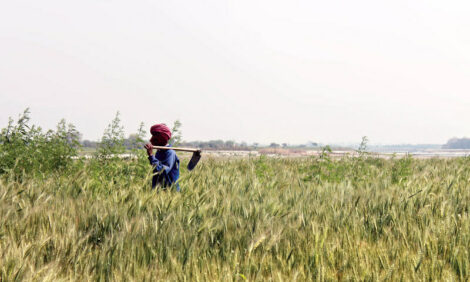



The Tricky Task Of Measuring GHG Emissions
UK - At a Defra-funded workshop at the University of Reading’s Centre for Dairy Research, the NFU’s climate change adviser, Ceris Jones, and Tried and Tested co-ordinator, Rebecca Wells, saw the different methods being used to improve the measurement of greenhouse gas emissions from agriculture.For those who have struggled many times with an uncooperative animal will guess that measuring methane emissions from livestock is no easy matter.
A range of techniques have been developed including fitted halters, feeding systems and even putting livestock in chambers to try and get reliable results.
“Getting a better handle on how emissions vary by breed and diet will enable scientists to provide a more realistic picture of GHGs from UK agriculture” said Ceris Jones.
“The work should also highlight opportunities for improving efficiency and productivity. For example, while methane is produced inevitably by bacteria in the rumen of cattle and sheep as they break down the cellulose in their diet, it also represents a loss of a ruminant’s energy intake. Therefore measures to mitigate enteric fermentation would not only reduce emissions, they may also raise animal productivity by increasing digestive efficiency.”
One of the studies showcased work by the University of East Anglia at the Wensum Demonstration Test Catchment to measure nitrous oxide emissions from the soil, and in particular the impact of field drainage.
The aim is to provide regional information for the UK inventory of GHG emissions.
“While farmers are making efforts to reduce emissions from soils, it is currently very hard to quantify success rates,” said Ms Wells.
“We would like to see a robust inventory, with local data based on soil type and farming systems, which can account for the positive steps farmers are taking towards improving their practices.”
Agriculture and Food Minister Jim Paice also attended the event and said that “Defra is committed to cutting the country’s greenhouse gas emissions by 80 per cent by the year 2050.”
He added: “The farming sector has got a huge role to play in helping us all achieve that goal, which is why it is great to see the technological innovations on display at this workshop, which will help the industry play its part in full.”
The event supported the work of the Global Research Alliance, an initiative started by the New Zealand government after the Copenhagen climate change talks in 2009.
It brings together researchers from different countries to find ways to grow more food without increasing greenhouse gas emissions. Defra and the devolved administrations in the UK have put £12.6 million into research to improve measurement and understanding of GHGs from agriculture.
TheCattleSite News Desk


